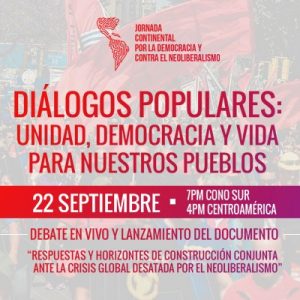On 22 September, the Continental Day for Democracy and against Neoliberalism (La Jornada Continental [1]), will hold an online discussion entitled “Popular dialogues: unity, democracy and life for our peoples”. Taking place at 4pm in Central America (12am midnight CET), the discussion will be broadcasted live on their Facebook [2] page in Spanish, English and Portuguese.
“It will be a moment to share what we have built, our views about what is happening in our region, which goes beyond the worsening of the situation caused by the Covid-19 pandemic. It is a more systemic view of the crisis we are experiencing”, said feminist activist Tica Moreno from the World March of Women [3] Brazil in an interview with Real World Radio.
Created in 2015, the Continental Day for Democracy and against Neoliberalism [1] is a process of struggle, work and mobilisation, composed of several social movements and organisations from the Americas. As their website [4] explains: “We are organised peoples from different social sectors: unions, women movements, peasants, environmentalists, regional organisations and groups. This is part of the initiatives which we have coordinated for decades in spaces for resistance, struggle and building of alternatives for and by the peoples of the Americas.”
Next Tuesday’s public discussion will involve several representatives from different peoples’ organisations from the Continental Day. During the activity, a publication entitled “Responses and horizons for joint action in view of the global crisis unleashed by neoliberalism” will be launched. The Continental Day will also present a common agenda of activities and mobilisations to take place in October and November.
In the interview with Real World Radio, Tica Moreno mentioned that the debate will be useful to promote a “perspective of struggle and resistance”, in addition to a deep systemic analysis of the crisis of neoliberalism in the Americas. The different social movements and organisations from the Continental Day are planning many actions in October: anti-imperialist actions, actions against debt and international financial institutions, and actions linked to the closing week of the World March of Women’s fifth international action. The Continental Day, as a point of coordination between these different organisations, is joining these various agendas.
The activity on 22 September also aims, according to Tica, to analyse some important political moments for the region at the moment, including the presidential elections in the US (3 November) and Bolivia (18 October), and the referendum in Chile (25 October) to decide whether to change the Constitution in force since 1980 during Pinochet’s dictatorship, as well as who will be in charge of drafting a new Constitution.
Every year in November, the Continental Day holds activities and mobilisations. Sometimes these are organised centrally, bringing all the social movements and organisations that are part of the process together in one country. Other years, the activities take place in a more decentralised way, in different American countries. This will be the case in 2020, with activities being held from 16 to 19 November.
Tica commented: “This is the time to strengthen our building of unity and strength in the struggle, with our political diversity, with internationalist responses articulated in the continent.” “As far as possible, we will aim to start demonstrating and mobilising in the streets again, keeping the necessary distance as required by the pandemic, but also reaffirming that this is our place to do politics,” she added.
Publication launch: “Responses and horizons of joint action in view of the global crisis unleashed by neoliberalism”
When asked about the publication which the Continental Day plan to launch during Next Tuesday’s activity, Tica highlighted that it includes “our systemic view of the fact that the pandemic exposed elements of this system and deepened the crisis already caused by neoliberalism in the latest period in our continent.”
In this way, the work includes elements that describe the situation in the Americas. “For instance the fact that, despite the pandemic, criminalisation and violence against social activists intensified in countries such as Colombia and Honduras”. Tica highlighted other structural aspects in the continent: the debts that are increasing due to the pandemic, the actions of transnational corporations to benefit from the health crisis, and racist violence, especially in Brazil and the US.
The new publication also shows “that there are different ways to deal with the crisis and the pandemic,” said Tica. And in this way the work describes “our articulated responses, what we have built in each movement and organisation, in the territories, in terms of solidarity, self-determination and popular organisation, to face the crisis, authoritarianism and attacks against democracy, which are also attacks against our living conditions,” she said. “For us as peoples in movement in the continent, our responses are fundamental, as this is where we take our energy from, our hope that it is indeed possible to have a horizon of transformation towards a new society,” explained the activist.
The representative of the World March of Women Brazil added that the new publication also includes the agenda of struggles, as an important aspect of their movement-building. “When we speak of horizons of transformation, when we say that there are indeed alternatives to neoliberalism, that it is still possible to overcome capitalism, and move towards a society where life is effectively at the centre, with equality, justice and solidarity, these are not just words. It is linked with the building of collective political subjects and with peoples’ organisations. So the publication also calls for a common struggle, for what we are already building and what we still need to build.”
